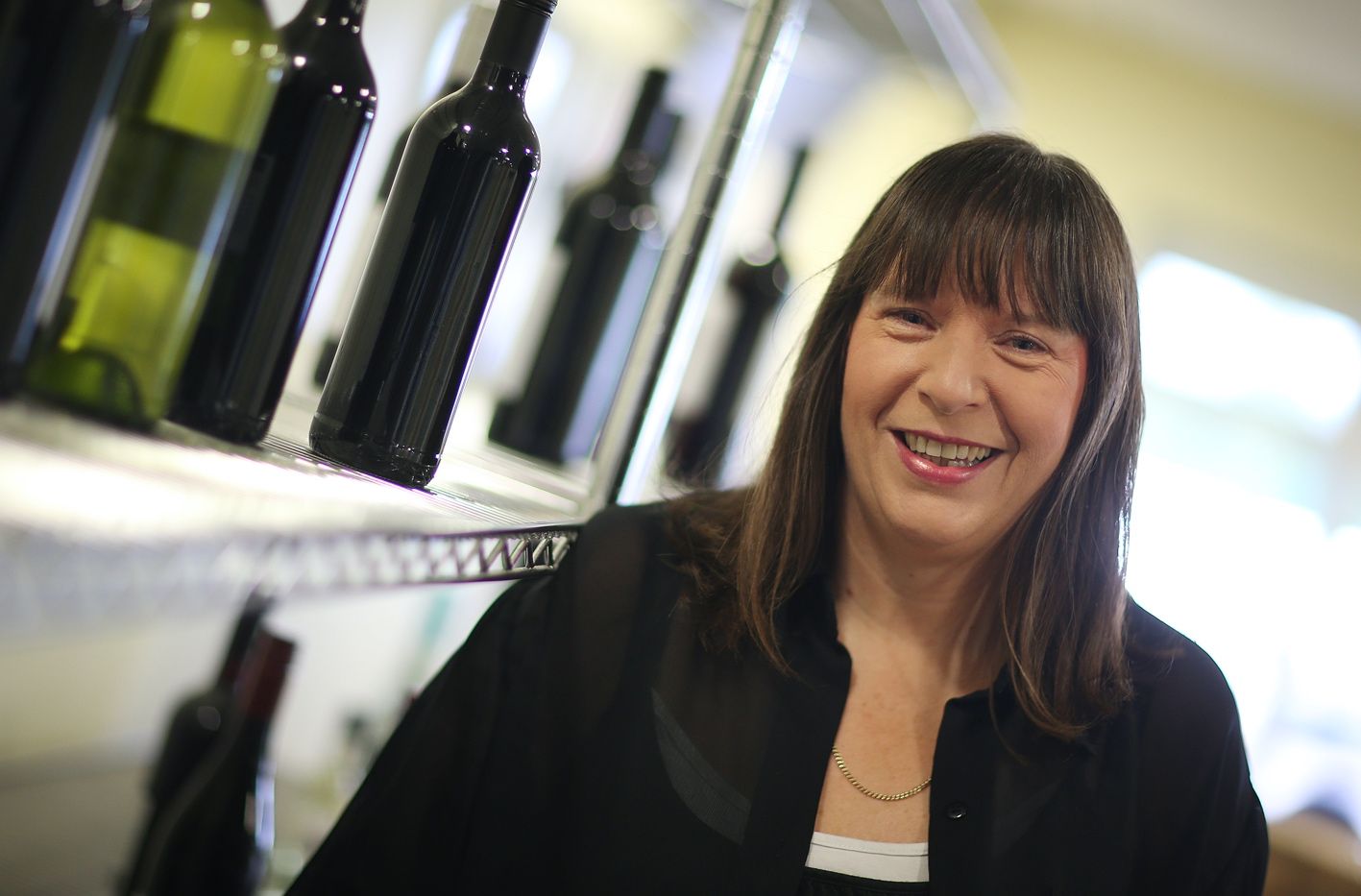“We’ve integrated sustainability into our business over the last 10 years, it’s now the norm for us and we’re happy it’s now coming to the fore with every business” says Lanchester Wines‘ Lesley Cook.
It has been a busy year, with the controversial duty changes going ahead in August – and, potentially, more to come in early 2025. What has been the impact of those changes so far?
There’s been loads of admin. The importation of alcoholic goods involves a lot of administration. We’re an HMRC bonded warehouse and Authorised Economic Operator (AEO) which means we’re effectively an inland port. Our bond and logistics departments work through every single wine to ensure every single tax code is implemented correctly. We’ve already invested tens of thousands of pounds in administration and computer systems (and) we’ll have to invest this again in updates. And so will every business in the wine trade.
Can there be any justification for the next stage, with those new bands?
The alcohol percentage of wine, in my opinion, isn’t the issue. High ABV wines such as Barolo, Chateauneuf-du-Pape, Amarone are high quality, expensive wines to be enjoyed for what they are, not for binge drinking. However, the proposed complexity is the issue: we deal with vintage variation in wine, so how are we going to handle that?Every single wine could change with every single vintage and, vintages change at different times, so we could sometimes be sitting with two vintages, with different ABV and different tax codes.
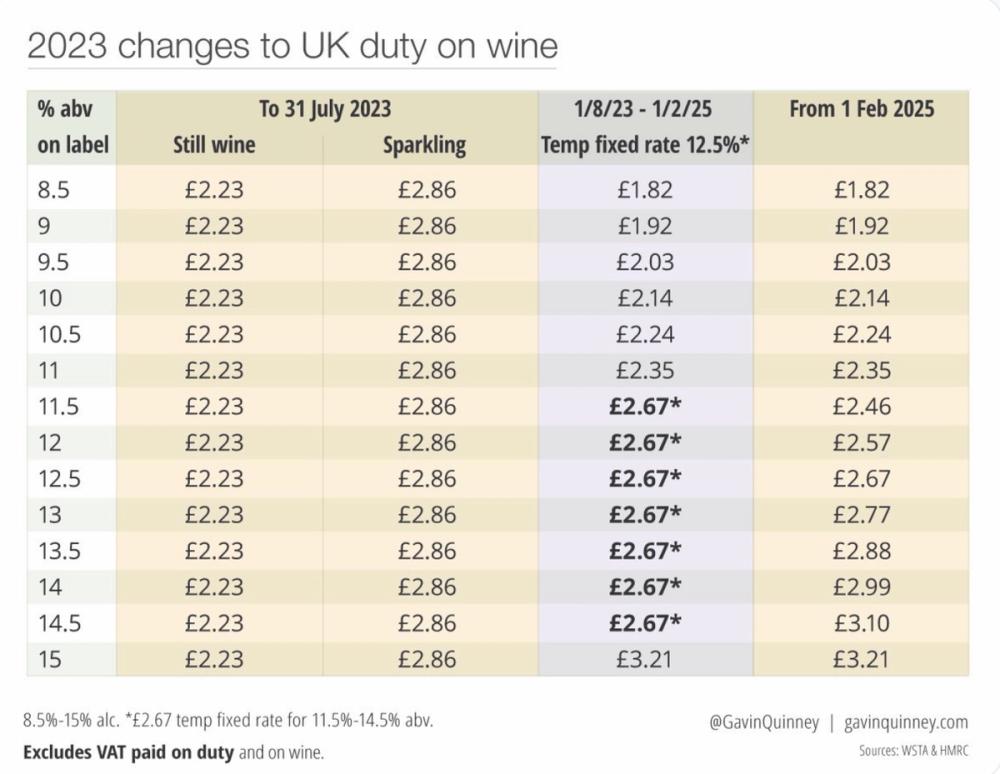
Wine labelling is already complex: we’re currently allowed half a degree of swing either side of an ABV figure but, under the proposed changes, vintage variation could result in labels becoming redundant, prices suddenly changing and tax codes being adjusted.
We’re working with our MP to lobby the government to try and stop this from happening, as I’m sure other alcohol businesses and bodies are too. It is my thought that we can maintain a stepped alcohol wine duty but at a simplified scale:
1. Below 11%
2. 11% – 13%
3. 13% – 15%
4. 15%+
This will not only maintain duty tax receipts but also save the UK wine industry millions of pounds in administrative fees. Although, obviously we’d prefer to leave the alcohol duty as it is.
What has happened to wine prices as a result of the duty changes?
We have not seen the full impact yet, to be honest. Unfortunately, we can’t offset the costs; businesses in our position don’t make enough profit to offset costs so unfortunately these have to be passed onto our customers. But, where we had to increase our prices in August, this increase is 100% duty on every line and, of course, some products, such as sparkling wines and lower ABV, have been reduced, which has also been passed onto the customer.
Why not just offer an enhanced range of lower alcohol wines?
We have obviously looked at that, but it is easier said than done. I’ve tried a lot of lower ABV wines, all the varietals you can think of, but the quality can suffer when you remove some of the alcohol and customers don’t want that – we don’t want that. We’ve only progressed with Pinot Grigio and White Zinfandel because they’re both naturally lower in ABV and lowering by a percentage or two hasn’t reduced the quality.
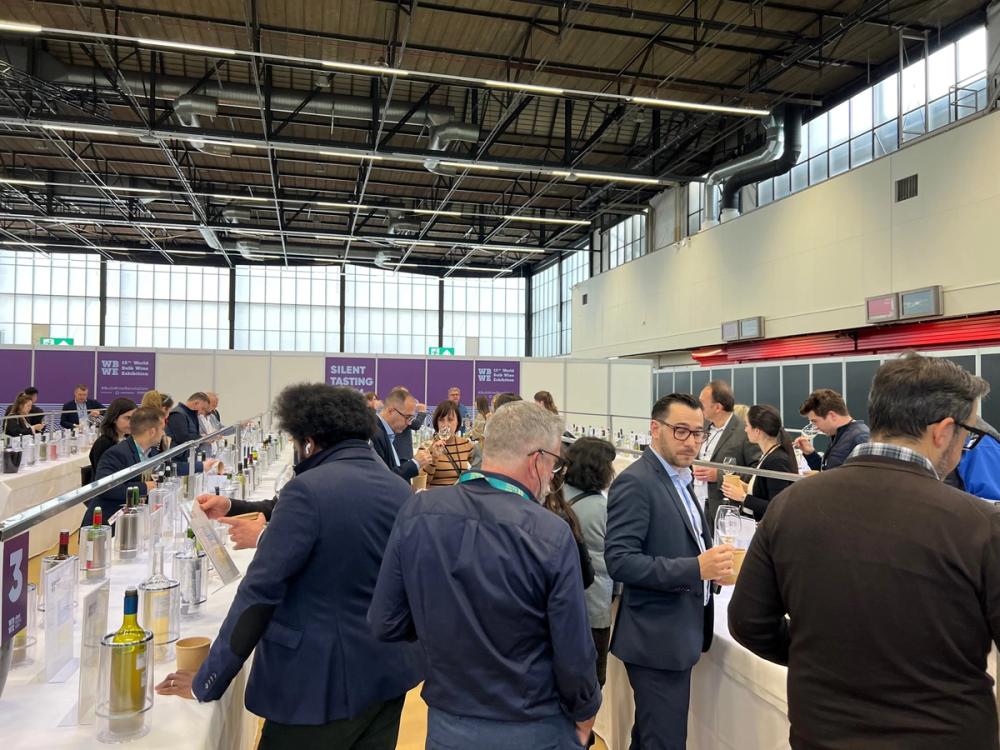
Producers at the World Bulk Wine Exhibition shared their frustrations about the new duty changes in the UK says Lesley Cook
I was at the World Bulk Wine Exhibition in Amsterdam a few weeks ago and it is a major challenge for the wineries we work with because it’s not as if the world is asking for this change, it’s only us here in the UK, as a result of the duty regime. If they pick early and the sales suffer as a result, they potentially have no home for that wine: some lower ABV wines can be thin, green and tannic to the extent you really wouldn’t know what you were tasting and I am not prepared to lower our quality.
We started working with our producers as soon as we knew these duty changes were imminent – to achieve lower ABV, the grapes are harvested earlier and the vines have been covered to reduce sun exposure. As you can imagine, this takes a lot of planning, it can’t be done instantly and has to be implanted by the vineyards while the grapes are starting to grow or before. But this ensures the wine still has the mouthfeel and profile you’d expect. Customers want to taste a Pinot Grigio, not a watered-down version.
Wine is a natural crop and the government has not given any of us an easy task. At some point, someone is going to lose out: it is unlikely the growers will continue to forfeit their crops purely for one country, so I guess they’ll look to sell elsewhere and the UK will suffer. The next year will be really interesting to see how much impact this has.
You have had some challenging vintages around the world in recent years. How are things on that front?
Not too bad, thankfully. South Africa is a little low on whites, but I contracted early so we haven’t been impacted. Marlborough Sauvignon Blanc is back to usual levels again, thankfully and the prices have settled with the 2023 vintage, so hopefully we shall see sales return to where they should be for Marlborough Sauvignon Blanc.
Australia still has quite a lot of red, but the harvest wasn’t so strong this year so I don’t think they will be dealing with the glut of wine that’s been there of late. China looks like it might be returning as a market for the Australians, but I am sure lessons have been learned and they’ll progress cautiously.
You have made some high profile new additions to the portfolio over the last year, with the likes of Champagne Moutard joining the Lanchester Wines list?
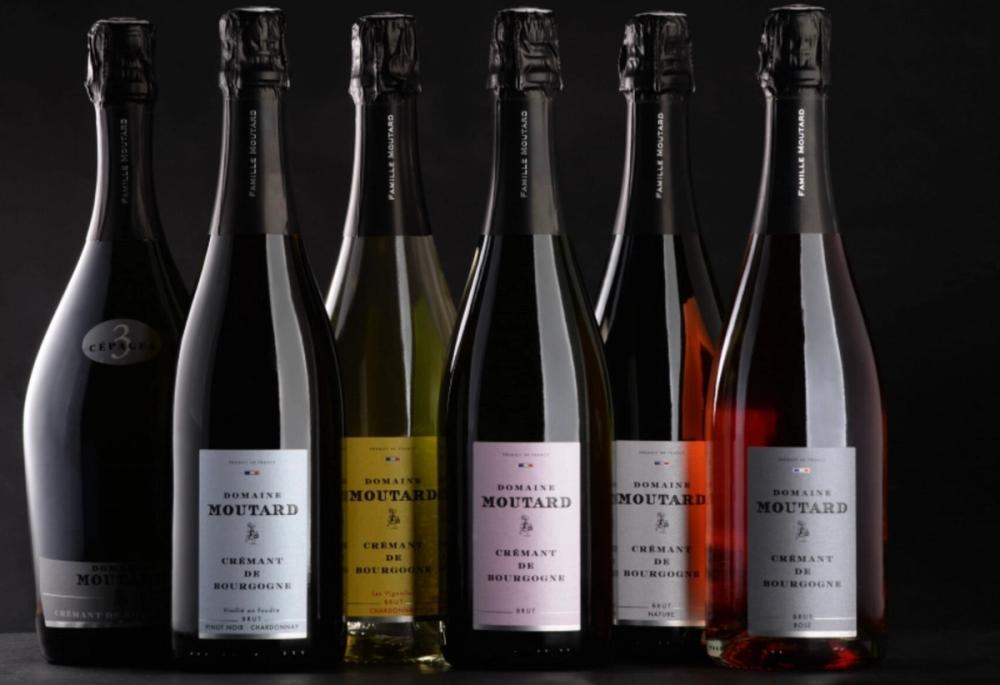
The range of Champange Famille Moutard wines that are now available in the UK through Lanchester Wines
Champagne Moutard has been a great addition to the portfolio. This all came together at ProWein: we were looking for a Champagne brand that fitted us as a company, with the family ethos and focus on sustainability. The quality of the Champagne is just excellent. It is going on wine lists left, right and centre and the feedback has already been fantastic. The Blanc de Blancs won 94 points at Decanter, rivalling wines at four or five times the price. We will continue to roll on with this next year.
It is exciting because there’s not only the Grande Cuvée Brut, the House Champagne, but also the unique Cuvée 6 Cépage made with the rare and unusual Arbane (an historic grape variety that almost became extinct) and through Champagne Moutard we’ve also listed the world’s only Vieilles Vignes Arbane Champagne. (You can read The Buyer’s article on Lanchester Wines link up with Champagne Moutard here).
What other additions have you seen success with?
We have made some real progress with Italy, adding a premium Prosecco Superiore DOCG to the portfolio. The whole team went out to Treviso in September with our partner, Tombacco. As part of this, we went to Valdobbiadene and Conegliano, the DOCG, a UNESCO World Heritage Site in the Prosecco Hills, to see Ballancin, a small family-run estate of 18 hectares. The quality is excellent with the wine (an Extra Dry Valdobbiadene Conegliano Prosecco Superiore DOCG) awarded 93 points at Decanter and a silver medal at the IWSC.
And it has been a year of celebration, with Lanchester Group recognised for its efforts on sustainability?
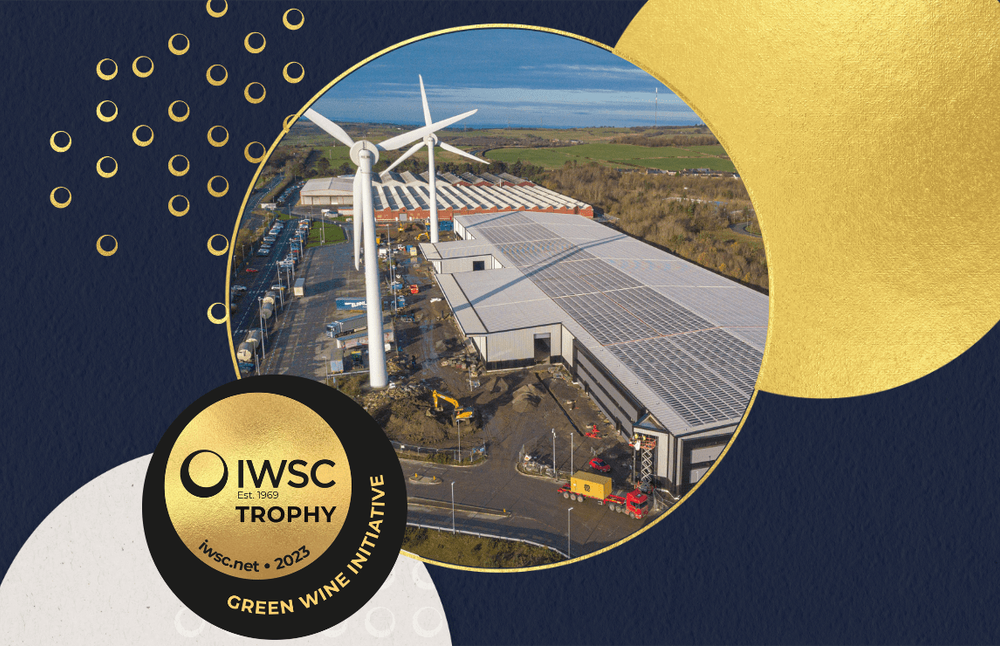
One of three big sustainability awards for the Lanchester Group in 2023
Absolutely, we have won three major awards which has been the cause of some Champagne glasses clinking here in County Durham. We won the IWSC’s Green Wine Initiative Trophy, the Drinks Business Green Importer/Distributor of 2023 and our founder, Tony Cleary was personally awarded the ESG Award as part of the LDC Lloyds Bank Top 50 Most Ambitious Business Leaders programme for 2023, which was richly deserved.
This has been a long time coming as we’ve integrated sustainability into our business over the last 10 years, it’s now the norm for us and we’re happy it’s now coming to the fore with every business.
What are you priorities for 2024?
We shall be solidifying partnerships with our suppliers, both bottled and bulk, keeping the focus on our sustainability credentials from grape to glass, as it’s an integrated process. After quality and pricing, we always check our suppliers’ approach to sustainability. Each supplier has its own sustainability story and they do what they can, where they can.

Lanchester Group’s Tony Cleary, second left, with some of the other winners in the LDC Lloyds Bank Top 50 Most Ambitious Business Leaders programme for 2023
This approach extends to logistics too: Lanchester Wines was awarded BRCGS AA accreditation this year, the leading provider of global supply chain assurance programmes. Greencroft Bottling, our sister company, has BRCGS AA+ and our haulage partner is also BRCGS-certified, so the wine we handle for both Lanchester Wines and Greencroft Bottling’s customers is accredited from start to finish.
What’s more, Greencroft Bottling is due to move into its new building, Greencroft Two – designed to be the most sustainable building of its kind – so that’s a really exciting development. The team will start the move in early 2024, with the first line, capable of filling up to 20,000 bottles an hour, starting production in spring.
What are the trends we are seeing as we head into 2024?
Although consumers seem to be going out less, sales suggest they’re spending more when they do and we’re seeing a trend for premiumisation. How is this going to work with the impact of the tax changes and the lower ABV wines and so forth, combined with cost of living issues and the impact of rising mortgage rates? It’s going to be an interesting year ahead.
- You can find out more about Lanchester Wines here.
- Lanchester Wines is a supplier partner to The Buyer.
